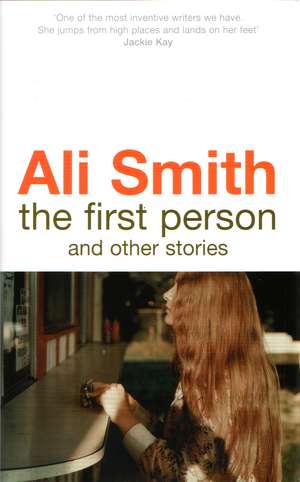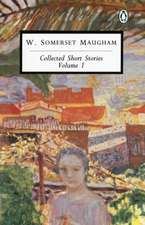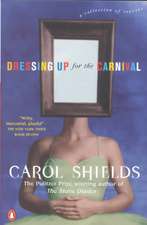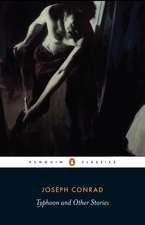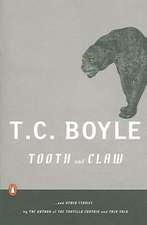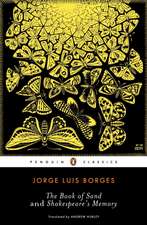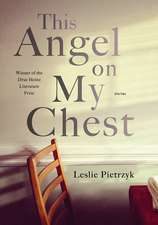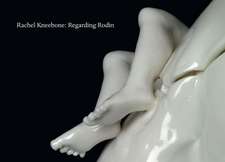The First Person and Other Stories
Autor Ali Smithen Limba Engleză Hardback – 2 oct 2008
In another, an innocent supermarket shopper finds in her trolley a foul-mouthed, insulting and beautiful child. Challenging the boundaries between fiction and reality, a third presents its narrator, 'Ali', as she drinks tea, phones a friend and muses on the relationship between the short story and - a nymph. Innovative, sophisticated and intelligent, the stories in "The First Person and Other Stories" are packed full of ideas, jokes, nuance and compassion.
Ali Smith and the short story are made for each other.
| Toate formatele și edițiile | Preț | Express |
|---|---|---|
| Paperback (2) | 52.01 lei 23-34 zile | +17.14 lei 6-10 zile |
| Penguin Books – 27 mai 2009 | 52.01 lei 23-34 zile | +17.14 lei 6-10 zile |
| Anchor Books – 31 dec 2009 | 107.27 lei 3-5 săpt. | |
| Hardback (1) | 147.32 lei 17-23 zile | |
| Penguin Books – 2 oct 2008 | 147.32 lei 17-23 zile |
Preț: 147.32 lei
Nou
Puncte Express: 221
Preț estimativ în valută:
28.19€ • 30.72$ • 23.75£
28.19€ • 30.72$ • 23.75£
Comandă specială
Livrare economică 29 martie-04 aprilie
Preluare comenzi: 021 569.72.76
Specificații
ISBN-13: 9780241144268
ISBN-10: 0241144264
Pagini: 224
Dimensiuni: 221 x 149 x 25 mm
Greutate: 0.39 kg
Editura: Penguin Books
Locul publicării:United Kingdom
ISBN-10: 0241144264
Pagini: 224
Dimensiuni: 221 x 149 x 25 mm
Greutate: 0.39 kg
Editura: Penguin Books
Locul publicării:United Kingdom
Notă biografică
Ali
Smithwas
born
in
Inverness
in
1962.
She
is
the
author
ofSpring,
Winter,
Autumn,
Public
library
and
other
stories,
How
to
be
both,
Shire,
Artful,
There
but
for
the,
The
first
person
and
other
stories,
Girl
Meets
Boy,
The
Accidental,
The
whole
story
and
other
stories,
Hotel
World,
Other
storiesand
other
stories,LikeandFree
Love.Hotel
Worldwas
shortlisted
for
the
Booker
Prize
and
the
Orange
Prize.The
Accidentalwas
shortlisted
for
the
Man
Booker
Prize
and
the
Orange
Prize.How
to
be
bothwon
the
Bailey's
Prize,
the
Goldsmiths
Prize
and
the
Costa
Novel
of
the
Year
Award,
and
was
shortlisted
for
the
Man
Booker
Prize.Autumnwas
shortlisted
for
the
Man
Booker
Prize
2017
andWinterwas
shortlisted
for
the
Orwell
Prize
2018.
Ali
Smith
lives
in
Cambridge.
Extras
True Short Story
There were two men in the café at the table next to mine. One was younger, one was older. They could have been father and son, but there was none of that practised diffidence, none of the cloudy anger that there almost always is between fathers and sons. Maybe they were the result of a parental divorce, the father keen to be a father now that his son was properly into his adulthood, the son keen to be a man in front of his father now that his father was opposite him for at least the length of time of a cup of coffee. No. More likely the older man was the kind of family friend who provides a fathership on summer weekends for the small boy of a divorce-family; a man who knows his responsibility, and now look, the boy had grown up, the man was an older man, and there was this unsaid understanding between them, etc.
I stopped making them up. It felt a bit wrong to. Instead, I listened to what they were saying. They were talking about literature, which happens to be interesting to me, though it wouldn’t interest a lot of people. The younger man was talking about the difference between the novel and the short story. The novel, he was saying, was a flabby old whore.
A flabby old whore! the older man said looking delighted.
She was serviceable, roomy, warm and familiar, the younger was saying, but really a bit used up, really a bit too slack and loose.
Slack and loose! the older said laughing.
Whereas the short story, by comparison, was a nimble goddess, a slim nymph. Because so few people had mastered the short story she was still in very good shape.
Very good shape! The older man was smiling from ear to ear at this. He was presumably old enough to remember years in his life, and not so long ago, when it would have been at least a bit dodgy to talk like this. I idly wondered how many of the books in my house were fuckable and how good they’d be in bed. Then I sighed, and got my mobile out and phoned my friend, with whom I usually go to this café on Friday mornings.
She knows quite a lot about the short story. She’s spent a lot of her life reading them, writing about them, teaching them, even on occasion writing them. She’s read more short stories than most people know (or care) exist. I suppose you could call it a lifelong act of love, though she’s not very old, was that morning still in her late thirties. A life-so-far act of love. But already she knew more about the short story and about the people all over the world who write and have written short stories than anyone I’ve ever met.
She was in hospital, on this particular Friday a couple of years ago now, because a course of chemotherapy had destroyed every single one of her tiny white blood cells and after it had she’d picked up an infection in a wisdom tooth.
I waited for the automaton voice of the hospital phone system to tell me all about itself, then to recite robotically back to me the number I’d just called, then to mispronounce my friend’s name, which is Kasia, then to tell me exactly how much it was charging me to listen to it tell me all this, and then to tell me how much it would cost to speak to my friend per minute. Then it connected me.
Hi, I said. It’s me.
Are you on your mobile? she said. Don’t, Ali, it’s expensive on this system. I’ll call you back.
No worries, I said. It’s just a quickie. Listen. Is the short story a goddess and a nymph and is the novel an old whore?
Is what what? she said.
An old whore, kind of Dickensian one, maybe, I said. Like that prostitute who first teaches David Niven how to have sex in that book.
David Niven? she said.
You know, I said. The prostitute he goes to in The Moon’s a Balloon when he’s about fourteen, and she’s really sweet and she initiates him and he loses his virginity, and he’s still wearing his socks, or maybe that’s the prostitute who’s still wearing the socks, I can’t remember, anyway, she’s really sweet to him and then he goes back to see her in later life when she’s an old whore and he’s an internationally famous movie star, and he brings her a lot of presents because he’s such a nice man and never forgets a kindness. And is the short story more like Princess Diana?
The short story like Princess Diana, she said.
Right.
I sensed the two men, who were getting ready to leave the café, looking at me curiously. I held up my phone.
I’m just asking my friend what she thinks about your nymph thesis, I said.
Both men looked slightly startled. Then both men left the café without looking back.
I told her about the conversation I’d just overheard.
I was thinking of Diana because she’s a bit nymphy, I suppose, I said. I can’t think of a goddess who’s like a nymph. All the goddesses that come into my head are, like, Kali, or Sheela-Na-Gig. Or Aphrodite, she was pretty tough. All that deer-slaying. Didn’t she slay deer?
Why is the short story like a nymph, Kasia said. Sounds like a dirty joke. Ha.
Okay, I said. Come on then. Why is the short story like a nymph?
I’ll think about it, she said. It’ll give me something to do in here.
Kasia and I have been friends now for just over twenty years, which doesn’t feel at all long, though it sounds quite long. ‘Long’ and ‘short’ are relative. What was long was every single day she was spending in hospital; today was her tenth long day in one of the cancer wards, being injected with a cocktail of antibiotics and waiting for her temperature to come down and her white cell count to go up. When those two tiny personal adjustments happened in the world, then she’d be allowed to go home. Also, there was a lot of sadness round her in the ward. After ten long days the heaviness of that sadness, which might sound bearably small if you’re not a person who has to think about it or is being forced by circumstance to address it, but is close to epic if you are, was considerable.
She phoned me back later that afternoon and left a message on the answerphone. I could hear the clanking hospital and the voices of other people in the ward in the recorded air around her voice.
Okay. Listen to this. It depends what you mean by ‘nymph’. So, depending. A short story is like a nymph because satyrs want to sleep with it all the time. A short story is like a nymph because both like to live on mountains and in groves and by springs and rivers and in valleys and cool grottoes. A short story is like a nymph because it likes to accompany Artemis on her travels. Not very funny yet, I know, but I’m working on it.
I heard the phone being hung up. Message received at three forty-three, my answerphone’s robot voice said. I called her back and went through the exact echo of the morning’s call to the system. She answered and before I could even say hello she said:
Listen! Listen! A short story is like a nymphomaniac because both like to sleep around– or get into lots of anthologies – but neither accepts money for the pleasure.
I laughed out loud.
Unlike the bawdy old whore, the novel, ha ha, she said. And when I was speaking to my father at lunchtime he told me you can fish for trout with a nymph. They’re a kind of fishing fly. He says there are people who carry magnifying glasses around with them all the time in case they get the chance to look at real nymphs, so as to be able to copy them even more exactly in the fishing flies they make.
I tell you, I said. The world is full of astounding things.
I know, she said. What do you reckon to the anthology joke?
Six out of ten, I said.
Rubbish then, she said. Okay. I’ll try and think of something better.
Maybe there’s mileage in the nymphs-at-yourflies thing, I said.
Ha ha, she said. But I’ll have to leave the nymph thing this afternoon and get back on the Herceptin trail.
God, I said.
I’m exhausted, she said. We’re drafting letters.
When is an anti-cancer drug not an anti-cancer drug? I said.
When people can’t afford it, she said. Ha ha.
Lots of love, I said.
You too, she said. Cup of tea?
I’ll make us one, I said. Speak soon.
I heard the phone go dead. I put my phone down and went through and switched the kettle on. I watched it reach the boil and the steam come out of the spout. I filled two cups with boiling water and dropped the teabags in. I drank my tea watching the steam rise off the other cup.
This is what Kasia meant by ‘Herceptin trail’.
Herceptin is a drug that’s been being used in breast cancer treatment for a while now. Doctors had, at the point in time that Kasia and I were having the conversations in this story, very recently discovered that it really helps some women – those who over-produce the HER2 protein – in the early stages of the disease. When given to a receptive case it can cut the risk of the cancer returning by 50 per cent. Doctors all over the world were excited about it because it amounted to a paradigm shift in breast cancer treatment.
I had never heard of any of this till Kasia told me, and she had never heard of any of it until a small truth, less than two centimetres in size, which a doctor found in April that year in one of her breasts, had meant a paradigm shift in everyday life. It was now August. In May her doctor had told her about how good Herceptin is, and how she’d definitely be able to have it at the end of her chemotherapy on the NHS. Then at the end of July her doctor was visited by a member of the PCT, which stands for the words Primary, Care and Trust, and is concerned with NHS funding. The PCT member instructed my friend’s doctor not to tell any more of the women affected in the hospital’s catchment area about the wonders of Herceptin until a group called NICE had approved its cost-effectiveness. At the time, they thought this might take about nine months or maybe a year (by which time it would be too late for my friend and many other women). Though Kasia knew that if she wanted to buy Herceptin on BUPA, right then, for roughly twenty-seven thousand pounds, she could. This kind of thing will be happening to an urgently needed drug right now, somewhere near you.
‘Primary’. ‘Care’. ‘Trust’. ‘Nice’.
Here’s a short story that most people already think they know about a nymph. (It also happens to be one of the earliest manifestations in literature of what we now call anorexia.)
Echo was an Oread, which is a kind of mountain nymph. She was well known among the nymphs and shepherds not just for her glorious garrulousness but for her ability to save her nymph friends from the wrath of the goddess Juno. For instance, her friends would be lying about on the hillside in the sun and Juno would come round the corner, about to catch them slacking, and Echo, who had a talent for knowing when Juno was about to turn up, would leap to her feet and head the goddess off by running up to her and distracting her with stories and talk, talk and stories, until all the slacker nymphs were up and working like they’d never been slacking at all.
When Juno worked out what Echo was doing she was a bit annoyed. She pointed at her with her curse-finger and threw off the first suitable curse that came into her head.
From now on, she said, you will be able only to repeat out loud the words you’ve heard others say just a moment before. Won’t you?
Won’t you, Echo said.
Her eyes grew large. Her mouth fell open.
That’s you sorted, Juno said.
You sordid, Echo said.
Right. I’m off back to the hunt, Juno said.
The cunt, Echo said.
Actually, I’m making up that small rebellion. There is actually no rebelliousness for Echo in Ovid’s original version of the story. It seems that after she’s robbed of being able to talk on her own terms, and of being able to watch her friends’ backs for them, there’s nothing left for her – in terms of story – but to fall in love with a boy so in love with himself that he spends all his days bent over a pool of his own desire and eventually pines to near-death (then transforms, instead of dying, from a boy into a little white flower).
Echo pined too. Her weight dropped off her. She became fashionably skinny, then she became nothing but bones, then all that was left of her was a whiny, piny voice which floated bodilessly about, saying over and over exactly the same things that everybody else was saying.
There were two men in the café at the table next to mine. One was younger, one was older. They could have been father and son, but there was none of that practised diffidence, none of the cloudy anger that there almost always is between fathers and sons. Maybe they were the result of a parental divorce, the father keen to be a father now that his son was properly into his adulthood, the son keen to be a man in front of his father now that his father was opposite him for at least the length of time of a cup of coffee. No. More likely the older man was the kind of family friend who provides a fathership on summer weekends for the small boy of a divorce-family; a man who knows his responsibility, and now look, the boy had grown up, the man was an older man, and there was this unsaid understanding between them, etc.
I stopped making them up. It felt a bit wrong to. Instead, I listened to what they were saying. They were talking about literature, which happens to be interesting to me, though it wouldn’t interest a lot of people. The younger man was talking about the difference between the novel and the short story. The novel, he was saying, was a flabby old whore.
A flabby old whore! the older man said looking delighted.
She was serviceable, roomy, warm and familiar, the younger was saying, but really a bit used up, really a bit too slack and loose.
Slack and loose! the older said laughing.
Whereas the short story, by comparison, was a nimble goddess, a slim nymph. Because so few people had mastered the short story she was still in very good shape.
Very good shape! The older man was smiling from ear to ear at this. He was presumably old enough to remember years in his life, and not so long ago, when it would have been at least a bit dodgy to talk like this. I idly wondered how many of the books in my house were fuckable and how good they’d be in bed. Then I sighed, and got my mobile out and phoned my friend, with whom I usually go to this café on Friday mornings.
She knows quite a lot about the short story. She’s spent a lot of her life reading them, writing about them, teaching them, even on occasion writing them. She’s read more short stories than most people know (or care) exist. I suppose you could call it a lifelong act of love, though she’s not very old, was that morning still in her late thirties. A life-so-far act of love. But already she knew more about the short story and about the people all over the world who write and have written short stories than anyone I’ve ever met.
She was in hospital, on this particular Friday a couple of years ago now, because a course of chemotherapy had destroyed every single one of her tiny white blood cells and after it had she’d picked up an infection in a wisdom tooth.
I waited for the automaton voice of the hospital phone system to tell me all about itself, then to recite robotically back to me the number I’d just called, then to mispronounce my friend’s name, which is Kasia, then to tell me exactly how much it was charging me to listen to it tell me all this, and then to tell me how much it would cost to speak to my friend per minute. Then it connected me.
Hi, I said. It’s me.
Are you on your mobile? she said. Don’t, Ali, it’s expensive on this system. I’ll call you back.
No worries, I said. It’s just a quickie. Listen. Is the short story a goddess and a nymph and is the novel an old whore?
Is what what? she said.
An old whore, kind of Dickensian one, maybe, I said. Like that prostitute who first teaches David Niven how to have sex in that book.
David Niven? she said.
You know, I said. The prostitute he goes to in The Moon’s a Balloon when he’s about fourteen, and she’s really sweet and she initiates him and he loses his virginity, and he’s still wearing his socks, or maybe that’s the prostitute who’s still wearing the socks, I can’t remember, anyway, she’s really sweet to him and then he goes back to see her in later life when she’s an old whore and he’s an internationally famous movie star, and he brings her a lot of presents because he’s such a nice man and never forgets a kindness. And is the short story more like Princess Diana?
The short story like Princess Diana, she said.
Right.
I sensed the two men, who were getting ready to leave the café, looking at me curiously. I held up my phone.
I’m just asking my friend what she thinks about your nymph thesis, I said.
Both men looked slightly startled. Then both men left the café without looking back.
I told her about the conversation I’d just overheard.
I was thinking of Diana because she’s a bit nymphy, I suppose, I said. I can’t think of a goddess who’s like a nymph. All the goddesses that come into my head are, like, Kali, or Sheela-Na-Gig. Or Aphrodite, she was pretty tough. All that deer-slaying. Didn’t she slay deer?
Why is the short story like a nymph, Kasia said. Sounds like a dirty joke. Ha.
Okay, I said. Come on then. Why is the short story like a nymph?
I’ll think about it, she said. It’ll give me something to do in here.
Kasia and I have been friends now for just over twenty years, which doesn’t feel at all long, though it sounds quite long. ‘Long’ and ‘short’ are relative. What was long was every single day she was spending in hospital; today was her tenth long day in one of the cancer wards, being injected with a cocktail of antibiotics and waiting for her temperature to come down and her white cell count to go up. When those two tiny personal adjustments happened in the world, then she’d be allowed to go home. Also, there was a lot of sadness round her in the ward. After ten long days the heaviness of that sadness, which might sound bearably small if you’re not a person who has to think about it or is being forced by circumstance to address it, but is close to epic if you are, was considerable.
She phoned me back later that afternoon and left a message on the answerphone. I could hear the clanking hospital and the voices of other people in the ward in the recorded air around her voice.
Okay. Listen to this. It depends what you mean by ‘nymph’. So, depending. A short story is like a nymph because satyrs want to sleep with it all the time. A short story is like a nymph because both like to live on mountains and in groves and by springs and rivers and in valleys and cool grottoes. A short story is like a nymph because it likes to accompany Artemis on her travels. Not very funny yet, I know, but I’m working on it.
I heard the phone being hung up. Message received at three forty-three, my answerphone’s robot voice said. I called her back and went through the exact echo of the morning’s call to the system. She answered and before I could even say hello she said:
Listen! Listen! A short story is like a nymphomaniac because both like to sleep around– or get into lots of anthologies – but neither accepts money for the pleasure.
I laughed out loud.
Unlike the bawdy old whore, the novel, ha ha, she said. And when I was speaking to my father at lunchtime he told me you can fish for trout with a nymph. They’re a kind of fishing fly. He says there are people who carry magnifying glasses around with them all the time in case they get the chance to look at real nymphs, so as to be able to copy them even more exactly in the fishing flies they make.
I tell you, I said. The world is full of astounding things.
I know, she said. What do you reckon to the anthology joke?
Six out of ten, I said.
Rubbish then, she said. Okay. I’ll try and think of something better.
Maybe there’s mileage in the nymphs-at-yourflies thing, I said.
Ha ha, she said. But I’ll have to leave the nymph thing this afternoon and get back on the Herceptin trail.
God, I said.
I’m exhausted, she said. We’re drafting letters.
When is an anti-cancer drug not an anti-cancer drug? I said.
When people can’t afford it, she said. Ha ha.
Lots of love, I said.
You too, she said. Cup of tea?
I’ll make us one, I said. Speak soon.
I heard the phone go dead. I put my phone down and went through and switched the kettle on. I watched it reach the boil and the steam come out of the spout. I filled two cups with boiling water and dropped the teabags in. I drank my tea watching the steam rise off the other cup.
This is what Kasia meant by ‘Herceptin trail’.
Herceptin is a drug that’s been being used in breast cancer treatment for a while now. Doctors had, at the point in time that Kasia and I were having the conversations in this story, very recently discovered that it really helps some women – those who over-produce the HER2 protein – in the early stages of the disease. When given to a receptive case it can cut the risk of the cancer returning by 50 per cent. Doctors all over the world were excited about it because it amounted to a paradigm shift in breast cancer treatment.
I had never heard of any of this till Kasia told me, and she had never heard of any of it until a small truth, less than two centimetres in size, which a doctor found in April that year in one of her breasts, had meant a paradigm shift in everyday life. It was now August. In May her doctor had told her about how good Herceptin is, and how she’d definitely be able to have it at the end of her chemotherapy on the NHS. Then at the end of July her doctor was visited by a member of the PCT, which stands for the words Primary, Care and Trust, and is concerned with NHS funding. The PCT member instructed my friend’s doctor not to tell any more of the women affected in the hospital’s catchment area about the wonders of Herceptin until a group called NICE had approved its cost-effectiveness. At the time, they thought this might take about nine months or maybe a year (by which time it would be too late for my friend and many other women). Though Kasia knew that if she wanted to buy Herceptin on BUPA, right then, for roughly twenty-seven thousand pounds, she could. This kind of thing will be happening to an urgently needed drug right now, somewhere near you.
‘Primary’. ‘Care’. ‘Trust’. ‘Nice’.
Here’s a short story that most people already think they know about a nymph. (It also happens to be one of the earliest manifestations in literature of what we now call anorexia.)
Echo was an Oread, which is a kind of mountain nymph. She was well known among the nymphs and shepherds not just for her glorious garrulousness but for her ability to save her nymph friends from the wrath of the goddess Juno. For instance, her friends would be lying about on the hillside in the sun and Juno would come round the corner, about to catch them slacking, and Echo, who had a talent for knowing when Juno was about to turn up, would leap to her feet and head the goddess off by running up to her and distracting her with stories and talk, talk and stories, until all the slacker nymphs were up and working like they’d never been slacking at all.
When Juno worked out what Echo was doing she was a bit annoyed. She pointed at her with her curse-finger and threw off the first suitable curse that came into her head.
From now on, she said, you will be able only to repeat out loud the words you’ve heard others say just a moment before. Won’t you?
Won’t you, Echo said.
Her eyes grew large. Her mouth fell open.
That’s you sorted, Juno said.
You sordid, Echo said.
Right. I’m off back to the hunt, Juno said.
The cunt, Echo said.
Actually, I’m making up that small rebellion. There is actually no rebelliousness for Echo in Ovid’s original version of the story. It seems that after she’s robbed of being able to talk on her own terms, and of being able to watch her friends’ backs for them, there’s nothing left for her – in terms of story – but to fall in love with a boy so in love with himself that he spends all his days bent over a pool of his own desire and eventually pines to near-death (then transforms, instead of dying, from a boy into a little white flower).
Echo pined too. Her weight dropped off her. She became fashionably skinny, then she became nothing but bones, then all that was left of her was a whiny, piny voice which floated bodilessly about, saying over and over exactly the same things that everybody else was saying.
Recenzii
“Sparkling and zany . . . so deft, so beautifully written.” —The New York Times Book Review
“Deftly moving . . . brimming with poetic whimsy. . . . These tales are vibrant and poignant, as though deconstructing our compulsion to connect with one another were as easy as writing a story.” —Elle
“[An] unsettling take on contemporary life. . . . Smith's style is terse and edgy. . . Provocative and enigmatic.” —BookPage
“Always imaginative, deftly written, and often funny to a fault, The First Person and Other Stories is a dizzying collection of stories by a writer unafraid. . . . One of the best surprises for anyone with a penchant for stories where language is foremost.”
—Steven Whitton, The Anniston Star (Alabama)
“The First Person and Other Stories target the romantic poseurs in all of us.” —Vogue
“Everyone has their own tale to tell in this bangup collection. . . . At once quirky and compulsively readable, this collection puts a layered and enjoyable spin on the many forms of the short story.”
—Publishers Weekly
“Intriguing. . . If Smith excels at creating, both in her stories and in her readers, a sense of eerie dislocation, she can also stir up an enchanting sense of whimsy.” —Booklist
“Smartly constructed. . . . Compellingly quirky demonstrations of how our imaginations react to ordinary people and everyday occurrences. . . . Smith is an original observer of the blessings and curses of living inside one's imagination.”
—Kirkus Reviews
“Deftly moving . . . brimming with poetic whimsy. . . . These tales are vibrant and poignant, as though deconstructing our compulsion to connect with one another were as easy as writing a story.” —Elle
“[An] unsettling take on contemporary life. . . . Smith's style is terse and edgy. . . Provocative and enigmatic.” —BookPage
“Always imaginative, deftly written, and often funny to a fault, The First Person and Other Stories is a dizzying collection of stories by a writer unafraid. . . . One of the best surprises for anyone with a penchant for stories where language is foremost.”
—Steven Whitton, The Anniston Star (Alabama)
“The First Person and Other Stories target the romantic poseurs in all of us.” —Vogue
“Everyone has their own tale to tell in this bangup collection. . . . At once quirky and compulsively readable, this collection puts a layered and enjoyable spin on the many forms of the short story.”
—Publishers Weekly
“Intriguing. . . If Smith excels at creating, both in her stories and in her readers, a sense of eerie dislocation, she can also stir up an enchanting sense of whimsy.” —Booklist
“Smartly constructed. . . . Compellingly quirky demonstrations of how our imaginations react to ordinary people and everyday occurrences. . . . Smith is an original observer of the blessings and curses of living inside one's imagination.”
—Kirkus Reviews
